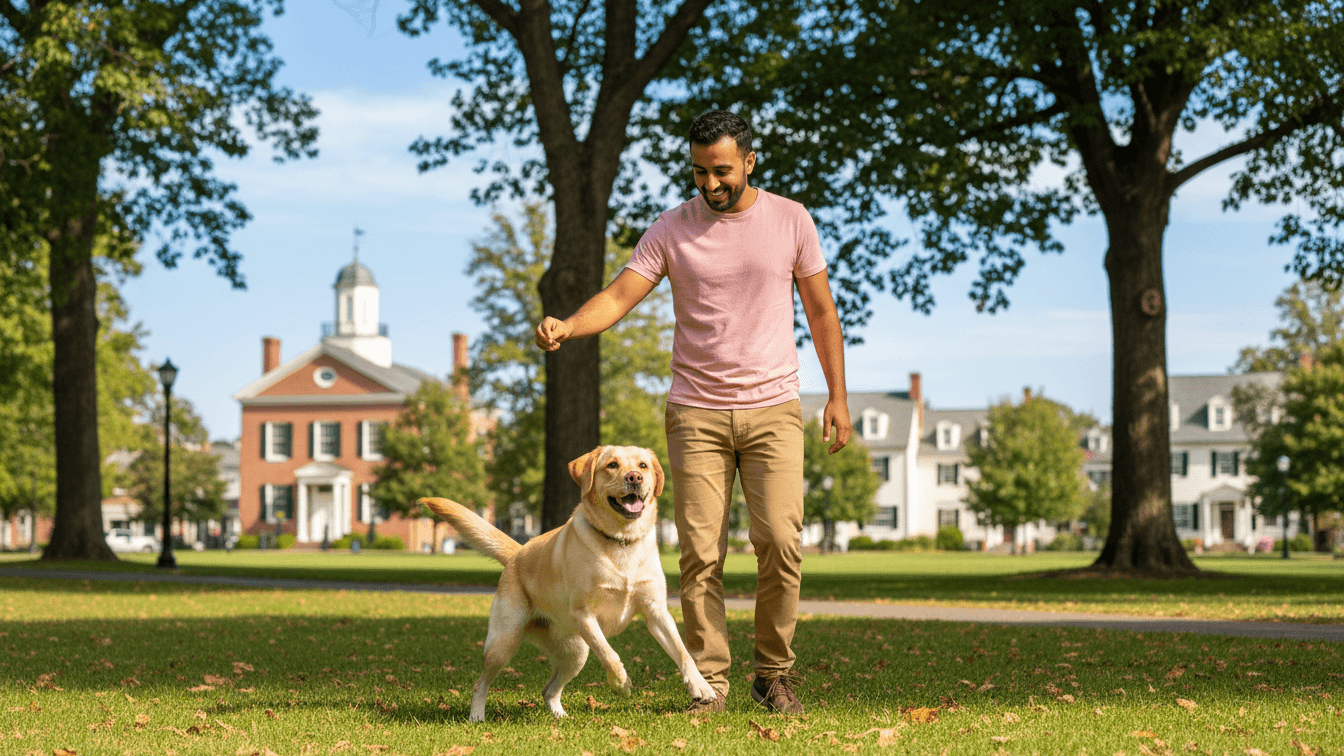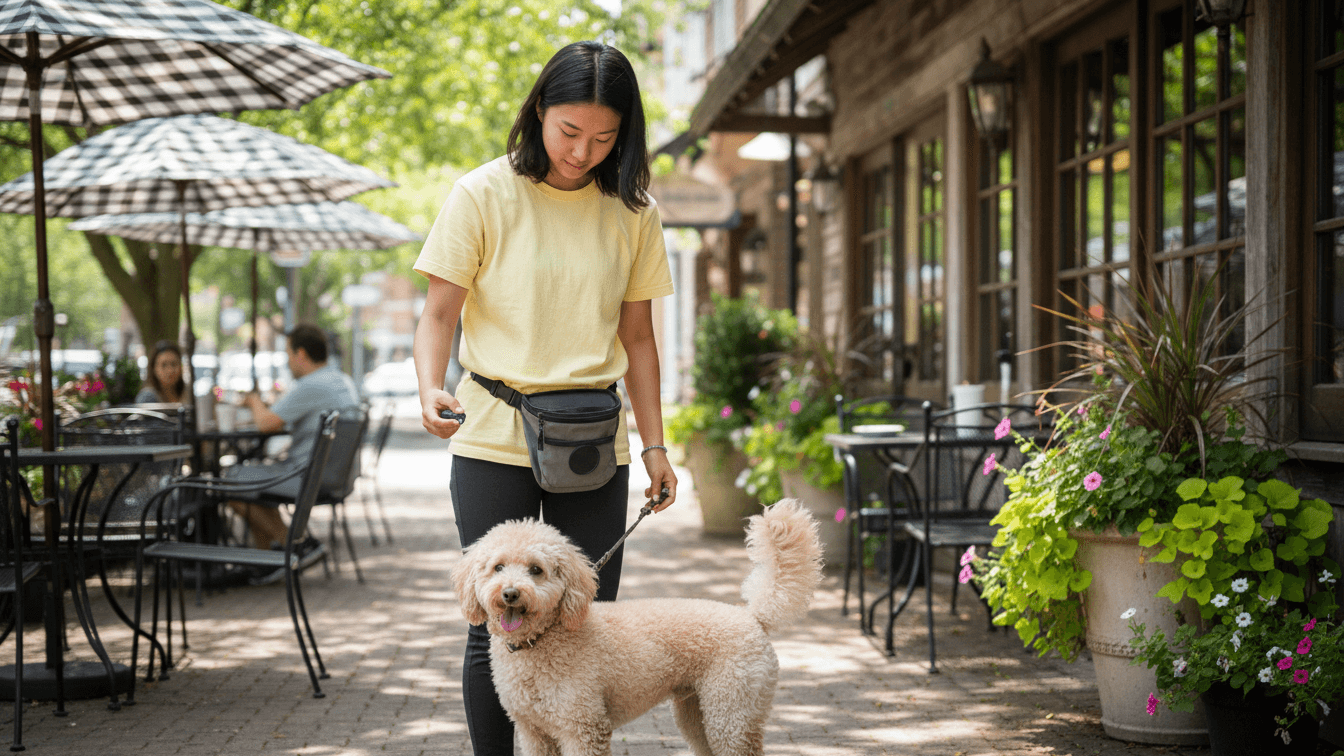Your Complete Guide to Choosing a Dog Trainer in Lewes and Surrounding Areas
Living with a dog in Lewes means you’ll be walking the historic downtown streets, visiting waterfront parks along the Lewes-Rehoboth Canal, and maybe taking your pup to spots near the Cape Henlopen State Park beach access points. Your dog needs to handle all of this calmly, from polite greetings with tourists strolling Second Street to staying focused near the busy farmers market on Saturday mornings.
Since Lewes sits in Sussex County, Delaware, most local rules follow town and county guidelines. When you find a professional dog trainer who understands these coastal community details, you’ll get better results both at home and out enjoying everything this historic port town offers.
How to Choose the Right Trainer
Start by looking for someone who uses positive reinforcement training and can set realistic goals for your Lewes lifestyle. This means your dog should learn to walk calmly through the historic district, stay focused near outdoor dining areas on Front Street, and handle ferry dock crowds without drama.
Credentials give you a quick way to compare trainers’ experience levels. Common dog trainer certifications include KPA-CTP, CPDT-KA, or IAABC-CDBC for behavior problems. If your dog has serious aggression issues, look for someone with CBCC-KA or a science-based program like CTC.
In-home dog training works great for puppy training, door greetings, and neighborhood leash skills. Group classes make sense once your dog can focus around other dogs, especially before you try busy spots like Canalfront Park or the downtown shopping district during peak tourist season.
Common Dog Training Methods Explained

Reward-based methods build the trust you want while creating lasting behavior changes. They also help your dog stay under control in public spaces, which matters when you’re navigating sidewalks shared with summer visitors and year-round residents alike.
Basic obedience covers sit, down, stay, place, recall, and leash training so your dog can handle beach walks, restaurant patios, and park visits without pulling or jumping on people. These skills become essential when you’re moving through the narrow historic streets or waiting in line at local shops.
Puppy classes focus on socialization, potty training, bite control, crate comfort, and early leash work. Starting with short, positive training sessions prevents bad habits from forming in the first place, which is especially important before your puppy encounters the many distractions this coastal town presents.
Behavior modification addresses fear, reactivity, resource guarding, or separation anxiety through careful desensitization and counterconditioning. For serious cases, ask if your trainer works with local veterinarians to create a complete treatment plan.
Private lessons and in-home sessions let you customize everything around your daily routines, while day training can speed up results when you’re short on time. Dog training classes help your dog practice good manners around other dogs and people in a controlled setting.
The best group classes give dogs plenty of space, screen participants carefully, and teach calm behavior rather than just excitement. Board and train programs provide intensive work, though you’ll need to practice daily to maintain the results once your dog comes home.
Specialized work like therapy dog training or service dog training requires extra structure, public-access skills, and a very clear step-by-step training program. Stay away from trainers who use fear, intimidation, or pain to get results, as humane methods are safer for everyone and much better for keeping peace in this tight-knit community.
Average Cost of Dog Training in Lewes (Updated for 2025)
Prices around Lewes and Sussex County depend on the trainer’s experience, how long sessions last, and where the training happens. Here’s what most local pet owners are paying in 2025.
| Service Type | Average Cost (Lewes/Sussex County) |
|---|---|
| Puppy classes (4-6 weeks) | $140-$250 total |
| Group obedience classes (4-6 weeks) | $150-$280 total |
| Private lessons (60-90 min) | $100-$175 per session |
| In-home coaching packages (4-6 visits) | $400-$850 total |
| Day training (trainer works your dog + handoff) | $425-$900 per week |
| Behavior consult for reactivity/anxiety (initial) | $140-$225 |
| Board and train (2-4 weeks) | $1,900-$4,200 total |
You’ll probably pay extra travel fees if your trainer needs to drive from Rehoboth Beach, Milton, or other Sussex County locations. Complex behavior modification work typically costs more than basic obedience training.
Make sure you understand what’s included in your dog training services, how the trainer tracks progress, and whether they offer a free consultation before you sign up. Ask about package discounts if you’re planning multiple training sessions.
Questions to Ask a Potential Dog Trainer
- What training methods do you use, and how do you keep sessions positive and low-stress for my dog?
- What credentials do you have, and do you keep up with continuing education through programs like CPDT-KSA?
- How will you customize the training program for my dog’s specific needs and our Lewes lifestyle?
- Do you offer in-home visits, dog obedience training classes, or day training, and which approach fits my goals best?
- How will we measure my dog’s progress and know when to add more distractions?
- What are the total costs, including any travel fees within Sussex County, and what’s your cancellation policy?
- Do you carry liability insurance, and can you show me proof?
- For behavior problems like aggression or separation anxiety, will you work with my veterinarian if needed?
- What should I practice between our sessions to help my dog keep improving?
- Have you worked with dogs in coastal environments who need to handle beach distractions, wildlife, and seasonal tourist crowds?
Local Lewes Rules and Considerations
Lewes enforces leash laws and nuisance rules to keep parks, beaches, and historic areas safe for everyone. Sussex County follows Delaware’s public health requirements too.
Dogs must be on leash in all public areas within Lewes city limits, except in designated off-leash zones. Keep a standard 6-foot leash with you for downtown walks, park visits, and any time you’re moving through the historic district or along the canal paths.
Delaware law requires current rabies vaccination for all dogs over three months of age. You’ll need proof of vaccination from your veterinarian, and this documentation may be checked when registering your dog or visiting certain public areas.
Excessive barking can be considered a nuisance in Lewes, so work with your expert dog trainers on alert barking and separation anxiety before neighbors start complaining. The town’s close-knit residential neighborhoods mean sound carries, especially in the quieter off-season months.
Delaware doesn’t require special licenses for dog trainers, but businesses must follow standard business registration requirements. If a trainer offers boarding services as part of their training for dogs program, they may need additional state oversight.
Sussex County provides animal control services and maintains records for lost pets, licensing information, and rabies vaccination requirements. The Town of Lewes has specific ordinances about dogs on beaches, which vary by season and location.
Local Lewes Resources for Dog Owners
These spots give you great places to practice polite manners, work on recalls, and provide safe enrichment for your dog. Always follow the posted rules and seasonal restrictions.
- Lewes Dog Park at Schiff Scout Reservation offers a fenced area where dogs can play off-leash under owner supervision. Practice recalls and calm greetings during quieter morning hours when fewer dogs are present.
- Cape Henlopen State Park allows leashed dogs on most trails and in campground areas year-round, giving you excellent opportunities to build focus around wildlife, hikers, and families. Dogs are prohibited on swimming beaches from May 1 through September 30 but allowed on the beach during off-season months.
- Canalfront Park provides waterfront walking paths where you can practice loose-leash walking with plenty of distractions like ducks, other dogs, and people enjoying the scenic views.

FAQs
How much does in-home dog training cost?
Most Lewes-area trainers charge $100-$175 per in-home visit, with discounts available when you buy packages of four or more sessions. Behavior problems like reactivity or aggression typically start at the higher end of that range.
Is in-home dog training worth it?
Absolutely, because you’re working on problems exactly where they happen. Your trainer can fix door manners, jumping on guests, counter-surfing, and yard reactivity right at home, then step outside to practice leash skills on your actual neighborhood sidewalks and around real-world Lewes distractions.
Can you pay someone to house train your dog?
Yes, many trainers offer puppy programs that include potty training, crate routines, and daily schedules. Day training can speed up the process while teaching you how to maintain the progress once your trainer hands your dog back at the end of each day.
What is the 3-3-3 rule for dog training?
This is a helpful timeline for new or adopted dogs: expect about 3 days for your dog to decompress, 3 weeks to learn your routines, and 3 months to feel completely settled. Good training programs work with this natural adjustment period rather than rushing your dog through the process.
How long will it take to reach my training goals?
Most puppies and friendly adult dogs show solid progress within 4-8 weeks if you practice daily between training sessions. Fear, reactivity, or aggression typically requires several months of careful behavior modification with gradual increases in difficulty and distraction levels.
What should I bring to group classes?
Pack a flat collar or harness, a 6-foot leash, high-value treats your dog loves, water, and current vaccination records if your trainer requests them. Leave retractable leashes at home for safety reasons, as they make it harder to control your dog quickly in a class setting.
What’s the leash law in Lewes?
Dogs must be leashed and under control in all public areas within Lewes, except inside the designated off-leash dog park. Keep that 6-foot leash handy for downtown walks, canal paths, historic district strolls, and any community events you attend with your pup.
Do I need a dog license in Lewes or Sussex County?
Sussex County requires dog licenses for all dogs over six months of age. You can obtain a license through Sussex County offices with proof of current rabies vaccination. Licenses must be renewed annually, and fees are lower for spayed or neutered dogs.
What shots does my dog need in Sussex County or Delaware?
Delaware law requires rabies vaccination for all dogs over three months of age. Your veterinarian may also recommend distemper-parvo, bordetella, leptospirosis, and Lyme disease vaccines based on your dog’s lifestyle and exposure risks in coastal Sussex County.
Are dog trainers required to be licensed in Lewes or Sussex County or Delaware?
No special trainer licenses exist in Delaware. Trainers follow normal business regulations, but if they offer boarding services as part of board and train programs, their facility may need to meet state requirements for kennels under Delaware’s animal welfare regulations.
Where can I practice off-leash recall?
Use the fenced Lewes Dog Park at Schiff Scout Reservation to keep things safe and legal while working on recall. Try visiting during quieter hours when you’re starting out so your dog has fewer distractions while learning to come when called.
Which dog parks allow training around Lewes?
Lewes Dog Park at Schiff Scout Reservation allows off-leash play within its fenced area and is the primary designated space for off-leash exercise. During off-season months (October through April), Cape Henlopen State Park beaches allow dogs, giving you wide-open spaces for distance recall work.
What beaches or trails allow dogs for training?
Cape Henlopen State Park allows leashed dogs on trails year-round and on beaches from October 1 through April 30, making it perfect for teaching calm focus around beachgoers, shorebirds, and surf. The walking trail from town to Cape Henlopen offers excellent leash training opportunities with varied terrain and distractions. Gordon’s Pond Trail provides a scenic paved path where you can practice polite walking around cyclists, joggers, and wildlife.
What should I look for in a certified dog trainer?
Look for someone who uses positive reinforcement methods and holds recognized credentials from organizations that require testing and continuing education. Ask about their experience with the specific issues you’re facing, whether that’s basic manners, socialization, or complex behavior problems.
How do I find the best dog trainer for aggressive dog training?
Aggression requires specialized expertise in behavior modification, so look for credentials like CBCC-KA or IAABC-CDBC that demonstrate advanced knowledge. The best trainers will conduct a thorough assessment, work with your veterinarian to rule out medical causes, and create a customized desensitization plan for your dog’s specific triggers.
Can my dog become a well-behaved dog even with a difficult start?
Yes, with consistent training and the right professional guidance, most dogs can learn better behavior regardless of their past. The key is finding a trainer who understands behavior modification and can help your dog build new, positive associations with the things that currently trigger fear or reactivity.
What’s included in a free consultation?
Most trainers offer a free evaluation where they meet you and your dog, discuss your goals, assess your dog’s current behavior, and explain their training approach. This gives you a chance to ask questions and decide if the trainer is the right fit before committing to a full training program.
The right combination of thoughtful planning, humane methods, and consistent practice around Lewes’s parks, beaches, and historic streets will help your dog become a confident, well-behaved companion. Whether you’re working on basic manners or addressing serious behavior challenges, choosing a trainer who uses positive reinforcement training will give you the best chance of long-term success in this unique coastal community.
